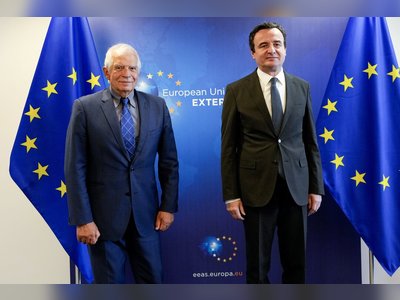German Chancellor Friedrich Merz Raises Concerns Over Israel's Actions in Gaza
Merkel's successor expresses deep concern over civilian suffering in Gaza, signaling a potential shift in Germany's longstanding support for Israel.
On October 7, 2023, following a Hamas attack, Germany reaffirmed its political and military support for Israel through comments made by then-Chancellor Olaf Scholz.
However, recent statements by new Chancellor Friedrich Merz have drawn attention to Germany's support for Israel amid the ongoing conflict in Gaza.
During a visit to Finland, Chancellor Merz stated, "We are deeply shaken by the fate of the civilian population and the terrible suffering of civilians in Gaza.” This remark has prompted questions about the shift in tone from the German leadership regarding Israel.
Peter Lintl, an analyst at the German Institute for International and Security Affairs, noted that Merz’s comments could suggest a desire to engage with Israeli leaders and assess the situation before articulating his views.
Lintl stated, "The conclusion reached by most countries around the world is that it is a terrible war with unclear objectives."
Merz's recent remarks express skepticism about the current operations of the Israel Defense Forces in Gaza.
He highlighted the humanitarian crisis, questioning the logic behind these operations in the context of combating terrorism and securing hostages.
"I no longer see any logic in how they serve the objective of fighting terrorism and freeing hostages.
In this respect, I am looking very, very critically at what has happened in recent days," Merz stated.
These comments followed a previous statement in Berlin, where Merz indicated that "the Israeli government must not do anything that its best friends are no longer willing to accept."
Merz emphasized the significance of these statements, noting that it seems time to publicly address the current situation, claiming, "What is currently happening is no longer understandable."
He did not address questions regarding Germany's arms exports to Israel, with a government official indicating that this topic falls under the responsibility of the security council chaired by Merz.
The Chancellor's comments mark a substantial tone shift for Berlin, which has historically served as one of Israel's strongest advocates in Europe.
Furthermore, Merz questioned the possibility of Israel's actions in Gaza potentially violating international law.
Historically, Germany's support for Israel has been intertwined with a notion known as "staatsraison," or national interest.
This concept was articulated by former German Chancellor Angela Merkel in 2008 when she expressed that Germany's historical responsibility toward its Jewish population is part of the nation's national interest.
She stated that for her, as Chancellor, Israel's security is non-negotiable.
Similar sentiments were echoed by Scholz following the October 7 Hamas attack, where over 1,200 people were killed in southern Israel and about 250 taken hostage.
The terminology associated with staatsraison gained prominence after Merkel's tenure ended in 2021, as discussed by analyst Lintl, who remarked on the expectation for politicians to invoke this term to be respected in their role, reinforcing that Israel’s security is a German national interest.
On his visit to Finland, Merz clarified that he has not entirely abandoned the principle of staatsraison, stating, "The security and existence of Israel are, as we have been saying for years and decades, a part of Germany’s staatsraison."
The impact of Merz's statements on Germany's relationship with Israel remains uncertain.
Nevertheless, he indicated plans to continue discussions with Israeli Prime Minister Benjamin Netanyahu and expressed intentions to facilitate a visit for Netanyahu to Germany, despite an arrest warrant issued against him by the International Criminal Court (ICC).
Reacting to Merz's comments, Israeli Ambassador to Germany, Ron Prosor, remarked that criticisms of Israel are taken seriously, particularly when articulated by a friend like Friedrich Merz.
However, recent statements by new Chancellor Friedrich Merz have drawn attention to Germany's support for Israel amid the ongoing conflict in Gaza.
During a visit to Finland, Chancellor Merz stated, "We are deeply shaken by the fate of the civilian population and the terrible suffering of civilians in Gaza.” This remark has prompted questions about the shift in tone from the German leadership regarding Israel.
Peter Lintl, an analyst at the German Institute for International and Security Affairs, noted that Merz’s comments could suggest a desire to engage with Israeli leaders and assess the situation before articulating his views.
Lintl stated, "The conclusion reached by most countries around the world is that it is a terrible war with unclear objectives."
Merz's recent remarks express skepticism about the current operations of the Israel Defense Forces in Gaza.
He highlighted the humanitarian crisis, questioning the logic behind these operations in the context of combating terrorism and securing hostages.
"I no longer see any logic in how they serve the objective of fighting terrorism and freeing hostages.
In this respect, I am looking very, very critically at what has happened in recent days," Merz stated.
These comments followed a previous statement in Berlin, where Merz indicated that "the Israeli government must not do anything that its best friends are no longer willing to accept."
Merz emphasized the significance of these statements, noting that it seems time to publicly address the current situation, claiming, "What is currently happening is no longer understandable."
He did not address questions regarding Germany's arms exports to Israel, with a government official indicating that this topic falls under the responsibility of the security council chaired by Merz.
The Chancellor's comments mark a substantial tone shift for Berlin, which has historically served as one of Israel's strongest advocates in Europe.
Furthermore, Merz questioned the possibility of Israel's actions in Gaza potentially violating international law.
Historically, Germany's support for Israel has been intertwined with a notion known as "staatsraison," or national interest.
This concept was articulated by former German Chancellor Angela Merkel in 2008 when she expressed that Germany's historical responsibility toward its Jewish population is part of the nation's national interest.
She stated that for her, as Chancellor, Israel's security is non-negotiable.
Similar sentiments were echoed by Scholz following the October 7 Hamas attack, where over 1,200 people were killed in southern Israel and about 250 taken hostage.
The terminology associated with staatsraison gained prominence after Merkel's tenure ended in 2021, as discussed by analyst Lintl, who remarked on the expectation for politicians to invoke this term to be respected in their role, reinforcing that Israel’s security is a German national interest.
On his visit to Finland, Merz clarified that he has not entirely abandoned the principle of staatsraison, stating, "The security and existence of Israel are, as we have been saying for years and decades, a part of Germany’s staatsraison."
The impact of Merz's statements on Germany's relationship with Israel remains uncertain.
Nevertheless, he indicated plans to continue discussions with Israeli Prime Minister Benjamin Netanyahu and expressed intentions to facilitate a visit for Netanyahu to Germany, despite an arrest warrant issued against him by the International Criminal Court (ICC).
Reacting to Merz's comments, Israeli Ambassador to Germany, Ron Prosor, remarked that criticisms of Israel are taken seriously, particularly when articulated by a friend like Friedrich Merz.
AI Disclaimer: An advanced artificial intelligence (AI) system generated the content of this page on its own. This innovative technology conducts extensive research from a variety of reliable sources, performs rigorous fact-checking and verification, cleans up and balances biased or manipulated content, and presents a minimal factual summary that is just enough yet essential for you to function as an informed and educated citizen. Please keep in mind, however, that this system is an evolving technology, and as a result, the article may contain accidental inaccuracies or errors. We urge you to help us improve our site by reporting any inaccuracies you find using the "Contact Us" link at the bottom of this page. Your helpful feedback helps us improve our system and deliver more precise content. When you find an article of interest here, please look for the full and extensive coverage of this topic in traditional news sources, as they are written by professional journalists that we try to support, not replace. We appreciate your understanding and assistance.










